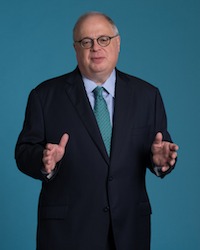Interview with Michael P. Maslanka, Employment Lawyer in Texas
We recently received the distinct pleasure of discussing employment law with Michael P. Maslanka, author of Work Matters and the author of five books on employment law. At the time of this interview, Michael was the Office Head of the Dallas office of Constangy Brooks and Smith. He is now Assistant Professor of Law at the University of North Texas (UNT)-Dallas College of Law.
 What initially inspired you to begin a career in the legal field?
What initially inspired you to begin a career in the legal field?
I got involved in employment law because someone took a chance on me. I was very interested in labor and employment law and applied to the NLRB in New Orleans, where I went to law school. The office told me there was nothing there (Reagan was coming into office and they expected budget cuts) but the office in Houston had some slots. They sent my application to them, and I never expected to hear a thing. A month later, the Regional Director in Houston calls me at 7:30 am (I was asleep) and offered me a job, sight unseen. I was so groggy; I did not really believe it until I got the letter the next week. I have always tried to pay it forward.
As a lawyer, do you think it’s more important to focus on the process of a case as a whole or the results a case?
Yes, I care about results. But here is the truth: you will win cases you should lose, and lose cases you should win, and it often comes down to chance and circumstance. So two points to never forget: despite this truth, work every case as hard as you can. There will be cases where your hard work and dedication will turn the tide. Here is the second: focus on the process, not the result. Clients want to be heard, listened to, and understood. If you provide that, then they will walk away feeling served, despite results.
What advice would you give to someone considering a career in law?
Advice to new people entering the legal field? As Oscar Wilde remarked, “be yourself, everybody else is taken.” Do not try and ape the style of another; learn from them but do not imitate them.
I love the law. But, to be candid, it has been a bad market for the last several years and this has become the new normal. Think hard about why you want to enter the field. Ask yourself hard questions: why do I want to enter the field—is it because I am truly interested or because it is a default position (i.e. “I have nothing else to do, so this is what I am going to do.”)
What is one of the most important cases of your legal career?
All cases are important cases because it is that client’s case. It may the only one he or she is ever involved in. And while I represent companies, a company is made up of human beings being accused of a terrible thing: discrimination. I look for ways to empathize, ease their burden, and at case end (win or lose) do an after action report so that the clients and its people learn what went right (and do more of that) and what didn’t go so well (and fix that).
What is the best career advice you have ever received?
The key to being an effective employment lawyer is to take a lot of facts, and figure out which ones matter. The best advice I ever got was from my supervisor at the NLRB, who reviewed my first legal brief after my first trial. He told me to re-write it. I was crushed, thinking it was brilliant. It wasn’t. He told me to re-write it like “Ned in the First Grade Reader:” This is Spot, Spot is a dog, see Spot run.” I call this the Dwain rule after my supervisor. I apply it to everything I write.
As an accomplished author of a blog related to employment law, what advice would you offer to the legal professional concerning the role of social media in their profession?
Social media should also encompass videos. Watch the following video. It is short and to the point. More and more we will see this type of information delivery, as opposed to law firm newsletters. A different generation wants a different delivery system. Video is it.
What quality do you think is most important for someone seeking a career in law?
Being humble. In “Inner Excellence”, Jim Murphy writes that the Navy Seals are the most humble group he has ever met because they know the enemy gets a vote. So, they plan on all contingencies, debate if they should go through the front door or the back window. Being humble is not being weak, it is being smart.
We thank Michael P. Maslanka for sharing his time to provide insights and advice to our audience. You can learn more about Michael by following him on Twitter, @worklawyer and LinkedIn.
